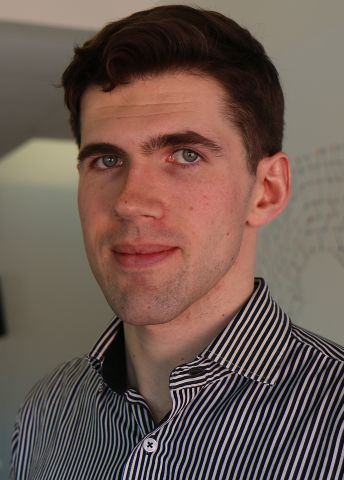
Program for mathematics 2018
Grant to a post-doctoral position abroad
Samuel Edwards
Uppsala University
Postdoc at:
Department of Mathematics, Yale University, New Haven, USA
Grant to a post-doctoral position abroad
Samuel Edwards
Uppsala University
Postdoc at:
Department of Mathematics, Yale University, New Haven, USA
Examining Equal Distribution
Samuel Edwards will receive his doctoral degree in mathematics from Uppsala University in 2018. Thanks to a grant from the Knut and Alice Wallenberg Foundation, he will hold a postdoctoral position with Professor Hee Oh at the Department of Mathematics, Yale University, New Haven, USA.
In his project, Samuel Edwards studies the long-term evolution of dynamical systems in homogeneous spaces. A homogeneous space is a special type of abstract space, for which the characteristic feature is that it exhibits many symmetries. This implies that objects, such as particles, that move randomly in such a space are constrained by a rich set of rules.
Dynamical systems are mathematical models that describe a trajectory’s evolution over time. Such dynamical systems are often chaotic; the state of these systems after a very long time is independent of the initial positions. For example, this means that after a very long time a particle’s position is independent of where it started; particles that were originally close together can be found far apart.
The special properties of homogeneous spaces mean that, for some classes of dynamical systems, it is still possible to describe a trajectory’s long-term evolution. In these cases, the trajectories are equally distributed throughout the space. For some special cases it is also possible to determine how far a given trajectory is from an equal distribution at any given time.
One of the aims of the project is to refine equal distribution results for dynamical systems whose evolution has already been described. Another goal is to further advance methods for studying the evolution of dynamical systems in homogeneous spaces. The results may have applications in other areas of mathematics where homogeneous spaces play a role, including algebra, geometry, and number theory.
Photo: Linda Koffmar